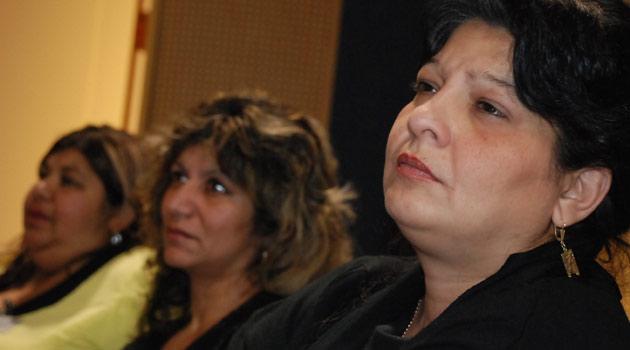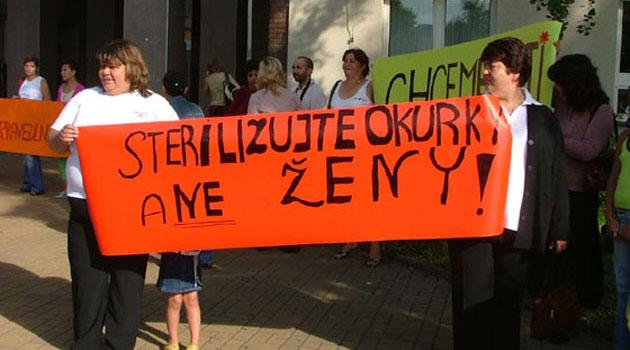Gwendolyn Albert: Seven UN agencies issue joint statement on stopping forced, coercive, and involuntary sterilization

In May 2014, seven UN agencies – the Office of the High Commissioner
for Human Rights, UNAIDS, the United Nations Development Programme,
UNICEF, the United Nations Population Fund, UN Women and the World
Health Organization –
jointly issued an interagency statement on eliminating forced, coercive
and involuntary sterilization. The document reviews the many
circumstances under which children, men and women have been sterilized
against their will around the world and provides clear guidance to
governments and the medical profession on how to bring these human
rights abuses to an end.
The joint statement is based on scientific evidence regarding medical, public
health and social work practices as well as on international human rights law
and standards. It reviews the historical importance of the eugenics movement,
which was predominant between 1870 and 1945, when coercive and involuntary
sterilizations were used in many countries to control populations in the name of
public health with the since-discredited aim of “breeding improvements” into the
human species.
Even after that aim was discredited, various countries continued to use
coercive sterilization as a population control tool without regard for the human
rights of the individuals involved. Governments have instituted coercive
pressures such as fines, punishments or threats to persuade doctors to sterilize
members of targeted groups, to persuade the members of those groups to undergo
sterilization, and to persuade social workers to help doctors sterilize certain
numbers of people. Governments have also instituted incentives, such as offers
of food, housing, land or money, to achieve these results. Misleading
information about sterilizations has also been disseminated to convince people
that these procedures could be “reversed” should children be desired in the
future. This is the kind of programme that ran in communist Czechoslovakia until
the regulations governing the provision of incentives for sterilization were
repealed in the early 1990s. It is still the kind of program being run in
certain states of
India today and by the authoritarian regime in
Uzbekistan.
The interagency statement recommends that states ban any programmes, whether
run with private or public funding, that induce patients to undergo
sterilizations or induce health-care providers to perform them. Legislation,
policies and regulations governing such programmes should be amended to make
sure the performance of sterilization is coercion-free. All health services must
be provided based on the appropriate clinical health standards in a way that
both respects and fulfils human rights, paying special attention to the needs of
members of groups that have been vulnerable to coercive, forced or involuntary
sterilization.
Those groups include
intersex
and transgender persons. Some countries’ legal regulations require intersex and
transgender people to undergo sterilization in order to receive official
documents that list their preferred gender. Doctors routinely perform medically
unnecessary surgeries on intersex persons in infancy to “correct” the genitalia
they were born with, often without consulting their parents, and these
procedures result in sterility. The interagency statement recommends that any
treatment of intersex persons resulting in sterility be postponed until the
person is mature enough to participate in informed decision-making and give
informed consent to such an operation.
Intersex or transgender persons have been treated this way in part because
they have long been viewed as somehow disabled. It was the flawed, incomplete
scientific understanding of the mechanisms of genetic inheritance developed
during the eugenic period that was used to argue for the tactic of sterilizing
persons with disabilities (whether actual or perceived) so as to prevent their
producing disabled offspring. In this sense, the prejudice against people with
disabilities (ableism) can very much be considered the root prejudice behind
much of the subsequent targeting of different ethnic or racial groups for
sterilization, as pseudo-scientific claims about particular ethnic or racial
groups’ “inferiority” (i.e., their presumed propensity for disabilities of
various kinds) were the very arguments made for sterilizing them as well.
In Europe this line of reasoning resulted most notably in the atrocities of the
Holocaust. Indeed, from a human rights perspective we must always bear in mind
that Article 2 of the
Genocide
Convention lists “Imposing measures intended to prevent births” within an
ethnic, national, racial or religious group as one of the definitions of a
genocidal act.
Fortunately, not only has humanity’s scientific understanding of genetic
inheritance advanced since 1945, our international human rights law has advanced
as well. The United Nations Convention on the Rights of Persons with
Disabilities, adopted in 2006, affirms the legal capacity of persons with
disabilities and their right to equality and non-discrimination, including the
human right to establish and maintain a family and to retain fertility. The
various motivations for sterilizing persons with disabilities without their
consent, motivations often described by governments or the medical profession as
somehow of benefit either to those persons or to the larger society, are simply
not justified under the Convention.
The interagency statement gives the example of “menstrual management” (a
clinical term for suppressing menstruation) which has been used a pretext for
sterilizing girls or women with disabilities. The statement notes that
procedures resulting in sterility are never the only medical option for helping
girls or women with disabilities to cope with menstruation, and that any
procedure resulting in sterilization must be only ever be provided on the basis
of the full, free and informed consent of the person concerned.
The interagency statement reiterates that no human being should ever be
forced by a third party or induced through incentives offered by a third party
to agree to and undergo sterilization. It is never acceptable for family members
(including parents and spouses), health-care providers, legal guardians or
public officers to induce or force such decisions. Unfortunately, in some
countries the law makes it possible for a court, a family member, an
institutional review board, a legal guardian, the state itself or a tribunal to
make legal decisions on behalf of persons with disabilities. These arrangements
violate the Convention, which affirms that persons with disabilities have the
right to recognition everywhere as persons before the law.
The Convention also says states must ensure that persons with disabilities
can access the support they might require to exercise their legal capacity. Such
support would mean that an advocate – a person who has no conflict of interest
and who does not enjoy any undue influence over the individual (i.e., not
someone with a stake in that person residing in an institution, for example) –
would help the individual exercise the right to make legal decisions.
Comprehensive counselling, information and support about contraceptives in
general should, of course, be accessible to everyone so we can all make informed
decisions about the use of contraceptives based on an understanding of their
reliability and safety. Sterilization is just one of the many contraceptive
methods we all should be able to consider, and our autonomy in decision-making
about this or any other contraceptive method must be respected.
The interagency statement recommends that counselling about sterilization
must provide accessible information about both the benefits and the risks of the
procedure, the alternatives to it, and its consequences in ways that respect
individual autonomy, confidentiality and dignity. Sterilization procedures must
only ever be performed on the basis of free, full and informed decisions made by
the individual to be sterilized, and individuals must be given the support and
the time they need to make such a decision. Health-care providers must never
pressure individuals to use any particular method of contraception and must
always respect an individual’s informed choice, even if it contravenes the
provider’s recommendations.
When obtaining informed consent to a sterilization procedure, health-care
providers must ensure that the individual’s decision has not involved any
incentives, misinformation, pressure or threats. Consent to sterilization must
never be a condition for access to medical care, including abortion, gender-affirming
treatment, any method of delivering children, or treatment for AIDS or HIV. It
must also never be a condition for receiving any other benefit such as
employment, identification, medical insurance, release from an institution, or
welfare.
If pregnancy is not recommended for a particular woman for medical reasons,
then sterilization should be offered only as one possible method from the full
range of contraceptive options. The interagency statement emphasizes that there
are never any “legitimate medical or social indications for contraceptive
sterilization”. Preventing pregnancy is never a medical emergency, and health-care
providers must not misrepresent it as such. They should never seek consent to
sterilization during moments of vulnerability when women are unable to make
fully-informed decisions, such as when requesting an abortion, during labour, or
immediately after delivery. Lastly, the interagency statement recommends that
consent to sterilization must always be clearly distinguished from consent to a
Caesarean delivery.
The victims of illegal sterilizations currently seeking redress in the Czech
Republic today have reported that
hospitals are refusing to provide them with copies of their medical records.
The interagency statement reiterates that access to medical records is part of
everyone’s right to effective access to information regarding one’s health. In
its proposal for a law to compensate the victims of these harms in the Czech
Republic, the Czech Helsinki Committee has also noted, based on the previous
experience of Romani women seeking remedies for these harms, that “[i]t is
presumed that it will not always be possible to prove the eligibility of an
entitlement claim through medical records, and therefore the proof of a claim [should]
be permitted through other means that might contribute toward clarifying the
case, in particular, testimony by the eligible person and witnesses, expert
evaluations, and other documents and items important to evaluating the claim.”
Hopefully those now drafting the law will do so in such a way that the lack of
such records does not pose an obstacle to persons who were wrongfully sterilized
and want to apply for compensation.
Previous investigations into these illegal sterilizations, such as the review
performed by the
Czech Public Defender of Rights in 2005, have discovered that even where
records of these procedures do exist, they very often display obvious
discrepancies or flaws. Those claiming compensation, therefore, must not be
forced to exclusively bear the burden of proof in these cases. It would be
unjust not to award compensation to such people solely for the reason that
through no fault of their own, their medical records no longer exist.
In this area as in so many others, there is still too much distance between
the human rights goals stated in our international documents and our practice on
the ground. Hopefully the Czech Republic will soon adopt a law that provides
fair compensation to all the victims of sterilization abuses so that justice can
be done for the wrongs of the past. This decision should not be made in silence
– its meaning should be explained to the public by the representatives of the
state. The decision to address this issue creates an excellent opportunity to
provide more human rights education on these issues, and such education is
always greatly needed, no matter where in the world we are born.
